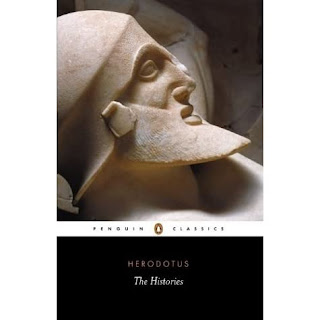I Read Books: The Histories
The Histories
Herodotus is known as the father of history, due to his “histories” (in ancient Greek meaning “enquiries”) being different in kind to, say royal chronicles or genealogies or other forms of records. He’s also known as that as he was popular, and because his is the earliest completely surviving Greek prose composition. His predecessors’ work has been lost or is fragmentary.
He's enquiring into the wars between Greece and Persia. This takes in the geography, anthropology and history of most of the Known World, this being Greece, the Persian Empire and the nations bordering them (the western Mediterranean is somewhat neglected, with a little of Libya and occasional excursions to the Greek cities of Sicily). He touches on accounts of stealing women between the cities of Asia and those of Greece, the most famous being the Trojan War.
The proximate cause, or causes, are the conquest of the Greek cities of Ionia (western Anatolia) by the kingdom of Lydia, which in turn is conquered by the Persian Empire under Cyrus the Great. Croesus, king of Lydia, famously asked the Oracle at Delphi what would happen if he invaded Persia and they tell him that a great kingdom will fall. They’re right, it’s Lydia.
Later the Greek cities in Ionia rebel with the assistance of Athens and other mainland and island Greek cities, which draws the Persians west. Along the way we learn about how the Persian Empire was formed (conquered the Medes) and the deeds of the Persian kings (fighting Scythians, defeating Lydia, invading India, conquest of Egypt). For each of these nations there is a lengthy digression.
This is where the tall tales come in, the most famous being the gold-mining giant ants of India. The further from where Herodotus may have visited we go the odder and less accurate it gets, which makes a fair amount of sense. So Ethiopia (anywhere south of the First Nile Cataract) is also described strangely, and so are the various nations of Scythia (the steppe dwellers from north of the Danube and the Caucasian mountains). There’s a couple of puzzling references to Sardinia, the largest island in the world (not the largest island in the world, actually smaller than Sicily) as well.
For a history, or indeed a work of geography, these are grievous flaws. But of course the discipline of history has not been invented when this was composed, and future historians, including notably antiquity’s second greatest Thucydides, built upon his work, in explicit critique. This is actually the good stuff. Don’t get me wrong, every story of betrayal or upholding agreements or fighting or failing to fight (a lot of failing to fight); every sacrifice, every list of buildings or donations to a shrine, it’s all there. Some attempt to trace cause and event, development of nations and people. But me, I like a tall tale, a rumour, a wild story. Herodotus had a lot of errors and that’s fun.
And there’s an awareness of the actual humans who fought (and sometimes didn’t), even third- or fourth-hand, after two and a half thousand years. And we get a glimpse into the author, Herodotus, and how he understood the world.
Read This: For the start of history, and better yet for some
ancient gossip
Don’t Read This: If you want the best estimates of what
actually happened


Comments